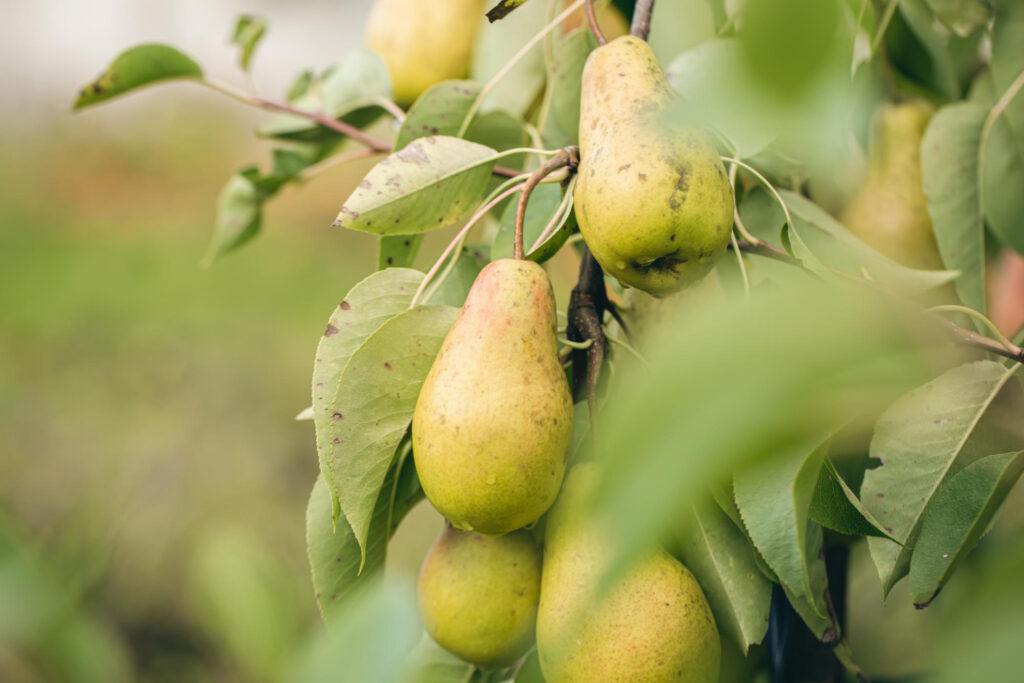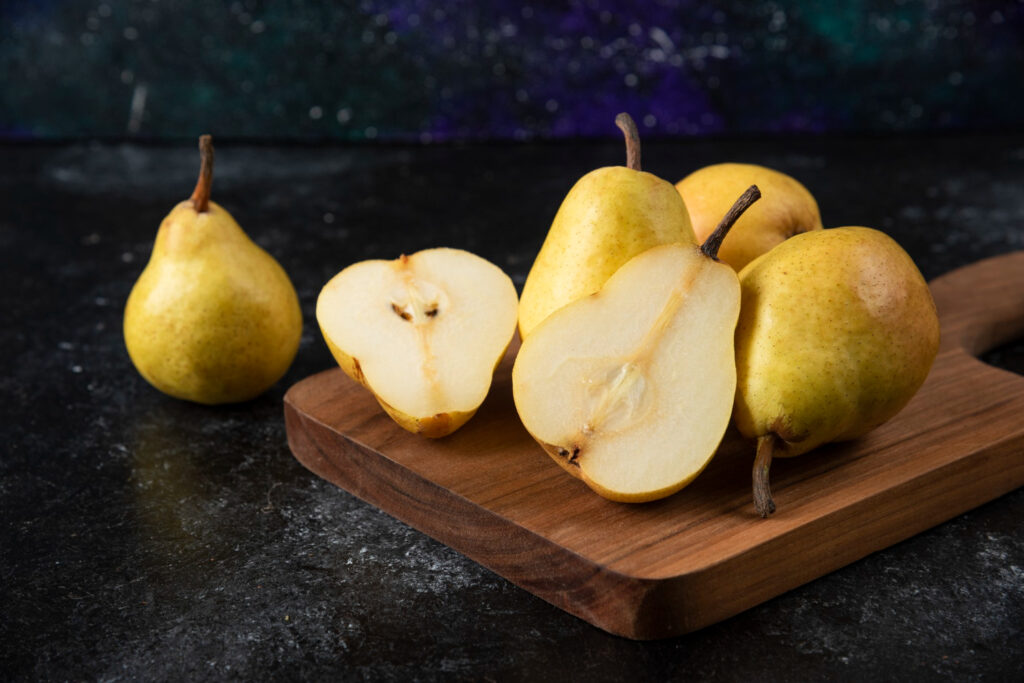
In this article
From Bosc to Anjou, there’s a pear for everyone’s taste. Besides their delightful flavor, pears are packed with nutrients. Their fiber content aids in digestive health and blood sugar regulation, while antioxidants in their skin combat chronic inflammation associated with various chronic diseases.
Keep reading to discover more about the health benefits of pears, tips for incorporating them into your diet, and the potential risks of consuming too many.
Promote Digestive Health
Pears are rich in both soluble and insoluble fiber. A medium pear provides about 20% of the daily value (DV) of fiber. Soluble fiber helps soften stools, making them easier to pass, while insoluble fiber adds bulk to stools, preventing and alleviating constipation.
Adequate fiber intake supports a healthy gut microbiome, which not only enhances digestive health but also boosts immune and mental health.
May Reduce Diabetes Risk
A large meta-analysis involving over 200,000 participants found that consuming apples and pears was linked to an 18% reduction in the risk of type 2 diabetes. Eating just one serving of apples or pears per week was associated with a 3% lower risk of developing type 2 diabetes. This study shows a correlation, not causation, but it suggests a potential connection between the consumption of these fruits and a reduced risk of diabetes.
One reason for this could be that pears are rich in flavonoids, a type of antioxidant. Another meta-analysis found that higher flavonoid intake is associated with a reduced risk of type 2 diabetes.
Moreover, the fiber in pears can help stabilize blood sugar levels, even though they contain carbohydrates. If you have diabetes, pairing pears with a protein source is recommended to prevent blood sugar spikes, but the fiber can help too.
Contain Phytonutrients to Prevent Inflammation
Pear skins are a good source of antioxidant and anti-inflammatory compounds, including phenolic acids, flavonoids, and triterpenes. While inflammation is essential for healing and fighting illness, chronic inflammation is linked to numerous chronic diseases.
These phytonutrients help neutralize free radicals, preventing inflammation-inducing oxidative stress associated with cancer, cardiovascular disease, diabetes, Alzheimer’s, Parkinson’s, and certain eye diseases.
High fiber intake is also associated with lower rates of inflammation, so the fiber content in pears may enhance their anti-inflammatory effects.
May Improve Cardiometabolic Health
A 2019 study examined the effects of eating pears daily on markers of cardiometabolic health. It found improvements in participants who consumed two pears daily compared to a control group who had a drink with the same caloric value. The participants, middle-aged and older adults with metabolic syndrome (a combination of risk factors for type 2 diabetes and cardiovascular disease), showed improved systolic blood pressure, pulse pressure (the difference between the top and bottom blood pressure numbers), and a reduction in waist circumference after 12 weeks.
High blood pressure can increase the risk of cardiovascular disease, and when paired with other risk factors like high fasting blood sugar levels, the risk for other ailments, including diabetes, rises. Thus, pears may help manage metabolic syndrome and reduce the risk of chronic diseases, particularly in middle-aged and older adults.
Additionally, soluble fiber helps prevent the absorption of some dietary cholesterol and fat. High cholesterol increases the risk of heart disease, so the fiber in pears can also support cardiovascular health.
Pear Nutritional Facts

Pears are a good source of carbohydrates, fiber, and various vitamins and minerals. According to the U.S. Department of Agriculture (USDA), one medium pear (178 grams) contains:
- Calories: 101
- Fat: 0.25 grams (g)
- Sodium: 1.78 milligrams (mg)
- Carbohydrates: 27.1g
- Fiber: 5.52g (20% DV)
- Added sugars: 0g
- Protein: 0.64g
- Copper: 0.15mg (16% DV)
Pears are an excellent source of fiber, which is crucial for digestion, blood sugar regulation, satiety, and cholesterol reduction.
Copper, the most abundant micronutrient in pears, is essential for various enzyme functions related to energy production and iron metabolism. Additionally, pears contain significant amounts of vitamin C, potassium, and vitamin K. Vitamin C is vital for immune health and non-heme iron absorption, potassium is crucial for cellular function, and vitamin K is important for blood clotting.
Risks of Eating Pears
Generally, pears are safe for most people. However, if you are allergic to pears, you should avoid them. The main risk of consuming too many pears is digestive upset due to their high fiber content. Increasing fiber intake too quickly can cause gastrointestinal symptoms like gas, bloating, or diarrhea. Since each medium pear contains 20% of the DV for fiber, be mindful of not overdoing it.
Tips for Consuming Pears
Several types of pears are commonly available, including Bosc, Bartlett, Anjou, and Asian pears. Each type has a different color, texture, and flavor, with various colors representing different nutrients. Mixing them up can be beneficial. Here are some tips for enjoying pears:
- Let pears ripen on the counter.
- Refrigerate pears once ripe to extend their shelf life.
- Freeze pears if they are about to spoil to prevent waste.
- Enjoy fresh pears on their own.
- Make a pear and gorgonzola cheese salad.
- Replace apples with pears in tarts, pies, and pastries.
- Use pears to make fresh jam.
- Poach pears and flavor with cinnamon for dessert.
- Add pears to a sandwich.
By incorporating pears into your diet, you can enjoy their delicious taste while reaping their numerous health benefits.
A Quick Review
Pears are not only delicious but also nutritious. They promote digestive health, reduce diabetes risk, combat inflammation, and improve cardiometabolic health. With their high fiber and antioxidant content, pears are a valuable addition to a healthy diet.











